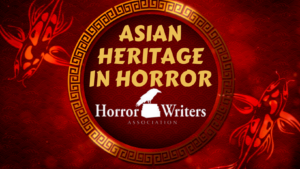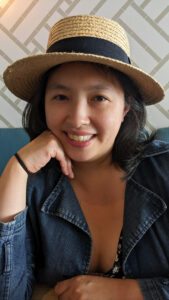Asian Heritage in Horror: Interview with Elaine Cuyegkeng

 Elaine Cuyegkeng is a Chinese Filipino writer. She grew up in Manila where there are many, many creaky old houses with ghosts inside them. She loves eldritch creatures both real and imaginary, ’80s pop stars, and caffeinated drinks with too much sugar. She now lives in Melbourne with her partner, their faerie child and their two small cat children. She is the 2021 Eugie Foster Award recipient for “The Genetic Alchemist’s Daughter” and has been nominated for the BSFA, Aurealis and Ditmar Awards. She has been published in the Bram Stoker winning anthology Black Cranes:Tales of Unquiet Women, in Pseudopod, Strange Horizons, Lackington’s, The Dark, and Rocket Kapre. You can find her on @layangabi on Twitter.
Elaine Cuyegkeng is a Chinese Filipino writer. She grew up in Manila where there are many, many creaky old houses with ghosts inside them. She loves eldritch creatures both real and imaginary, ’80s pop stars, and caffeinated drinks with too much sugar. She now lives in Melbourne with her partner, their faerie child and their two small cat children. She is the 2021 Eugie Foster Award recipient for “The Genetic Alchemist’s Daughter” and has been nominated for the BSFA, Aurealis and Ditmar Awards. She has been published in the Bram Stoker winning anthology Black Cranes:Tales of Unquiet Women, in Pseudopod, Strange Horizons, Lackington’s, The Dark, and Rocket Kapre. You can find her on @layangabi on Twitter.
What inspired you to start writing?
I’ve always loved writing and stories—I think that’s true for many writers. We’ve always been compelled to tell stories in one form or another whether it’s ghost stories whispered at each other in school halls, fan fiction about our latest fictional crushes, or roleplaying games on lj (now, sadly obsolete and disappeared into the ether).
I didn’t start pursuing professional writing—the work of writing and submitting to markets until I was in my twenties. A friend introduced me to A Kite of Stars by Dean Francis Alfar. It was a fairy tale—a story about a young woman on a quest. But it was very distinctly a Filipino story —you recognised the world as soon as you stepped inside it. It was like recognising your own accent, wandering lost on a foreign street. It was like coming home. And I realized that was the story I wanted to write.
Then, without intending it, I veered off into horror.
What was it about the horror genre that drew you to it?
It’s funny because I didn’t think of myself as a horror writer—I hide in my girlfriend’s shoulder during the scary parts of a movie. I haven’t seen IT or Candyman even though I really want to see these seminal works of horror canon—because I am a giant chicken. It took my friends to point out I was writing horror, even in pieces I primarily thought of as SF—I was writing about parasite caterpillars brainwashing their foster sisters and oracles who had their nervous systems connected to galleon ships.
I think I’m drawn to horror because it’s such a perfect vehicle for exploring the what it’s like to live on the margins—in my case, what it’s like to be a member of a diaspora community, and what it’s like to be queer. Horror inherently has themes of transformation —and about agency in the face of human and inhuman horrors (and there is so much). If you’re queer, if you’re Filipino, there’s so much beauty and horror in our history and in our present. Horror is a natural language for expressing that experience—living through the ways your agency is stripped or compromised; how you are othered.
Do you make a conscious effort to include Asian Diaspora characters and themes in your writing and if so, what do you want to portray?
Most of my stories do have Filipino or Filipino-Chinese characters. For me, it’s not necessarily a conscious choice—but it’s what feels right for the stories I want to tell. The House that Creaks is a story about the horrors of the Martial Law era—and the monster House loves a Filipino-Chinese family and their baby. These Constellations is a space opera fairy tale about the galleon trade and the abuses of Spanish colonialism. Leto Chua Mercado and her mother are part of the Filipino-Chinese community and Leto has grown up with its pressures—the need to perform a perceived perfection. It’s a very, very diasporan response to living in the world.
What has writing horror taught you about the world and yourself?
Writing horror has helped me grapple to terms with my heritage and my queerness —for a long time there was a great tension between the two and sometimes there still is. In retrospect it’s what’s driven a lot of my storytelling: I write a lot about transformation and body horror: of being changed by forces beyond your control. But I’ve also learned that we are driven to create and push back in spite of those pressures—your art can save you if you let it.
How have you seen the horror genre change over the years? And how do you think it will continue to evolve?
There has been so much queer and multicultural work explode in the past few years. It’s wonderful! I love that Asian diaspora writers are using our own experiences, our own folklore and canons to write the stories of our hearts. A lot of diaspora writers I think are still grappling with guilt—whether we have any claim or ownership of our stories. I hope that changes as more and more of us release our work into SF and horror.
How do you feel the Asian community has been represented thus far in the genre and what hopes do you have for representation in the genre going forward?
One of the things that delights me so much is that so many Asian and Asian diaspora writers also writing queer fiction. I love it—I love that we are grappling with difficult, thorny things like intergenerational trauma and ghosts, that we are writing about diaspora communities and families.
Who are some of your favorite Asian characters in horror?
I am about to betray my love for villains! Liin, from Alyssa Wong’s Natural Skin. Liin felt so real to me and so familiar—I grew up with the same narratives around beauty and the obsession with perfection, so I felt, really felt, for Liin. And I’m terrified of her.
I also love Queen Cho from Kingdom—like Liin, she grows up in a privileged but abusive household. She doesn’t have any worth to her family except as a pawn and she becomes a compelling, terrifying monster: this powerless girl who grows up to become what she is.
Who are some Asian Diaspora horror authors you recommend our audience check out?
I have already mentioned Alyssa Wong—her stories are as sharp and beautiful as diamond knives. Let me also talk about other writers! Cassandra Khaw writes such dark gorgeous fiction—her little mermaid story terrifies the hell out of me. I also love Isabel Yap’s stories—and her short fiction are available now as part of a Never Have I Ever. Black Cranes, an anthology I’m part of, showcases women horror writers of Asian descent. L. Chan has written beautiful, terrifying stories about ghosts and haunted houses and festivals, and Vanessa Fogg’s Taiya is such a beautiful alchemy of sadness and horror.
What is one piece of advice you would give horror authors today?
Write what enchants you; write what terrifies you; write about the monsters that keep you up at night. And if they all happen to be the same thing? Magic.
And to the Asian writers out there who are just getting started, what advice would you give them
Find your people: I think a support group is absolutely essential when you’re embarking on your writing journey. I would not be the writer I am without my friends.



